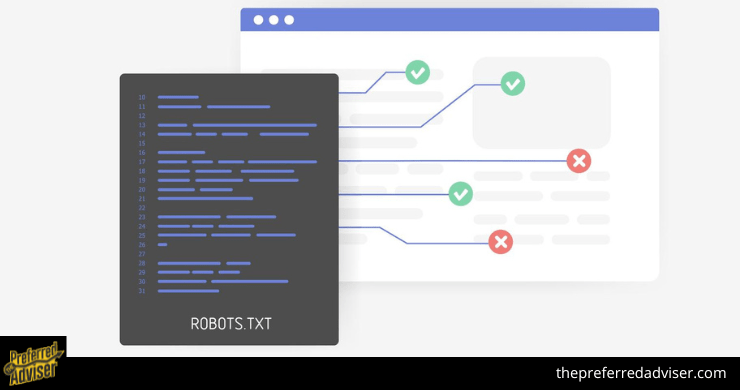It can be complex to establish what is causing your search rankings and traffic levels to decrease.
Possible causes of reduced website traffic could include any of the following: alterations to Google’s system, technical issues, an inability of the server to cope with the necessary load, or previously linking sites discontinuing the linkage.
If you have noticed a decline in your site ranking or visitor numbers, you might want to look into some of the common problems Loren Baker writes about on this website. It’s the perfect place to begin your inquiry.
In this article, we deepen our exploration of the topic and consider additional potential causes of your difficulties.
1. You Haven’t Updated Your Site in a Long Time
The success of your website will largely depend on your particular area of focus, so it is essential to make consistent changes to your site in order to stay ahead of the competition. Examining other entities within the same field will give an indication of what steps might need to be taken in order to remain competitive.
Overall, if you neglect to add new content, build links, or do any kind of online advertising, the chances of your website gaining traction and increasing in size will be minimal.
It is uncommon that taking the longer route and waiting for a long time for vehicles to pass would be beneficial; this is a highly unusual case instead of being typical. If you do not act, how can you anticipate to get any true advantage over the competition?
You may wish to keep your approach straightforward by posting a blog every day, especially if you have not invested a significant amount of energy into your blog recently.
It may be much more difficult and it may take a lot of effort to observe any advancement.
If your only blog every once in a while, it might not produce enough fresh material necessary to have your website stay prominent in your market.
Doing a competitor analysis can help you discover how your rivals are attaining the highest spots on SERPs.
2. You Haven’t Made Any Significant Changes to Your Content
This fits into the continuous changes we have been discussing. If you do not adjust your content, you could be severely compromising your possibilities of getting a good search engine result and consequently hindering the number of visitors to your site.
In competitive industries where staying up-to-date is essential to attain a high position on the search engines, not keeping your site current can result in a decrease in rankings.
In this occurrence, irrelevance signifies that you haven’t revised your website or altered your material whatsoever, making it an unimportant and antiquated outcome.
3. You Updated Your Site With a New Design
Updating your website with a different look does not automatically result in a decrease in visitors. It is especially the case when accounting for redirection and other issues that could cause issues with your site’s capability to be crawled and indexed.
An instance of something that can cause a decrease in search engine rankings is that a website’s new template has an abundance of JavaScript, which can interrupt crawling and indexing.
If your JavaScript-based design gets in the way of what search engine spiders need to do, which are crawl and index, then your web page’s visibility and accessibility on a search engine will decrease.
What will occur if Google cannot explore or arrange your website?
If you depend on WordPress and you have not disabled the ‘Discourage search engines from indexing this site’ setting in Reading in the Settings section after you update your system, you may experience issues with search engine visibility and visitor numbers.
It is imperative that your SEO expert is involved in any new website start-up venture. Things that the typical developer may not be aware of can be identified by them.
Developers who use a headless CMS may have good intentions, but if it prevents the proper crawling and indexing of content, the website’s search engine rankings and traffic will suffer as a result.
It is essential to appoint a search engine optimization expert who is knowledgeable in server-side matters, which can negatively influence your Search Engine Results Page effectiveness.
4. You Removed Traffic-Driving Content
Say you embarked on a new content audit project. One recommendation is to take away slender and duplicate content from your website.
However, an issue arises; the review ignores if the webpages are getting any traffic or not, only concentrating on their excellence.
When this occurs, you will find that your content audit is actually hindering you instead of helping you. This instance shows that there is more than one viewpoint to consider regarding the material in question.
Although you might need to deal with redundant and shallow content on your website, it won’t make much difference if you don’t attend to the technical aspects of SEO and identify which pages are being accessed and which aren’t.
If you take away several pieces with a lot of visitors and replace them with something that isn’t as applicable or impressive, you may potentially lose the amount of people who viewed those pages.
5. Your Robots.txt File Can Cause Indexing Issues
 One of the most prevalent technical blunders I come across when carrying out an audit is that the customer has blocked all pages and folders from being crawled because they did not correctly set up robots.txt.
One of the most prevalent technical blunders I come across when carrying out an audit is that the customer has blocked all pages and folders from being crawled because they did not correctly set up robots.txt.
The usage of this file can have a significant impact on your web crawling and indexing, so it is important to be mindful of how to best (or not) use it.
As an example, adding the phrase “Disallow: /” to the beginning of your robots.txt will result in a decrease in traffic, since search engines will be prohibited from exploring and noting your entire website.
6. Links Removed from Sites
This happens more often than you may think.
If you notice a decrease in visits to your page, you should examine if any of your back links have been eliminated before assuming it’s a punishment.
Webmasters like to clean up their links. Studying the process of examining and eliminating link profiles is beneficial in understanding links of this sort.
7. A Site Linking to You Went Down
If a website that was referring visitors to your website shut down completely, it could lead to a permanent decline in the number of visitors from that domain. It is impossible to guard against or thwart this from occurring.
You will only have to substitute that website with a different one when it comes to obtaining links. After determining this, you will then have to search for alternative websites to link with you which will raise your traffic.
8. Tracking the Wrong Rankings
If your website has been around for a long time, the search terms you have been using may no be applicable any longer. Evaluate your own searching habits and compare them to the key words that appear in your Search Console information.
Are you using language particular to your industry or sector that may not be understood by your prospective customers? A lot of individuals will research different variations of the same issue and remain unable to locate a solution or response to their concern.
Engineers employed by Google have made substantial advancements in their ability to comprehend natural language. Nowadays, individuals can type in a phrase that more closely resembles normal human language in order to generate results. It is simpler to gain a high position if you write your material using simple language.
Recently, search engines have become aware of this pattern. Instead of focusing solely on a handful of terms, they are judging websites based on entire sentences and other aspects of more human language.
Look at your keywords and keyword phrases. If you’re using dated or ordinary keywords, your tracking is inaccurate and you must revise your plans.
9. Lost Links
You could have lost your place in the search rankings and had a corresponding drop in website visitors due to a loss of links. Look at your website in the last three months for missing connections with a program (like Majestic, Ahrefs, or CognitiveSEO).
If you have experienced a decline in your rankings, it may be due to a decrease in the quantity of links. There are more questions you should ask about this link loss:
- Is the link drop sitewide?
- Are the lost links located on the same pages of your site where you have seen a drop in rankings?
- Has there been a drop in inbound links to your pages that have lost their ranking?
- Do you see dropped links to pages on your website that link other pages that have lower rankings?
Find out where the inbound links originate from and the cause of them being faulty if they have disappeared or are not functioning properly. You can then either remove, replace, or retain them.
Each link should be checked individually to determine your next steps:
- If the links were removed intentionally, it could indicate that they were not natural links and could, if they weren’t already, be flagged and penalized by Google. Let these links go.
- Sometimes links break or change during a site update. In these cases, you might have a chance of convincing the site owner to restore them.
- If the internal links were replaced with new links to a different source, you have the option to link to the new source, too.
Substitute the outdated connections with fresh ones that work.
It is worth the time and effort to invest in software or programs that can track broken links in order to avoid losing rankings in the future. By doing this, you can be preemptive and carry out remedial actions before you drop in rankings.
10. Broken Redirects
If you make any changes to your website’s domain such as launching a new one, moving to a different server, or restructuring, your rankings may dip unless you implement a well-defined 301 path of redirection.
Broken redirects are every SEO professional’s worst nightmare. You must ensure that when employing a 301 redirection, your XML sitemaps, canonical tags as well as your links are altered appropriately.
A 301 redirect is similar to a change of address notification for the internet. This announcement informs search engines that one page, many pages, or the entire website has been transferred. You are requesting for your website visitors to be directed to your updated address rather than the old one.
If done properly, both your current and new web address won’t experience a drop in ranking and no penalties will be assigned by search engines due to duplication of content.
11. Manual Actions
It is possible that Google has imposed a punishment if you spot a major and sudden fall in your website rankings. Manual actions are carried out by people rather than being determined by computer algorithms.
If you are still showing up in the search results of other search engines such as Yahoo or Bing, it is almost certain that you have been targeted by a Google penalty.
Whether the consequence of your mistake is done manually or through a machine, it’s important that you solve the issue to avoid the possible punishment. The most effective way to begin is to inspect alerts from within your Google Search Console profile.
Check the messages menu and Manual Actions section for any alerts. On this page, you can see where a Google employee has detected that some of your pages did not meet their regulations.
You can get tips and data on how to resolve the difficulties.
12. Algorithm Changes
 Google continuously searches for methods to refine approaches and attain better outcomes by altering the algorithms. These alterations have adversely affected many sites and caused their rankings to shrink.
Google continuously searches for methods to refine approaches and attain better outcomes by altering the algorithms. These alterations have adversely affected many sites and caused their rankings to shrink.
In order to keep away from the consequences of Google’s modifications, implement a reliable multi-channel marketing and traffic scheme that contains social networks and other marketing venues.
13. Natural Changes in Search
At times, your search engine rankings may decrease without any consequence connected to your website. Google has regularly altered the sort of outcomes according to user behavior.
For instance, if there is an abrupt rise in queries for a certain subject, Google may display newer results at the top and move non-changing content further down the search result.
If your content falls into the second group, then your ranking will go down. Examining Google Trends could provide some insight as to why the disparities exist.
Conclusion
It is essential to remain composed when you encounter a drop in traffic or search engine rankings. Falling into a state of panic does not improve the situation and can even cause more difficulty.
Inhale deeply and consider what may not be working correctly. Sometimes, the solution may be an easier option than trying to fix an intricate issue. It is possible to identify the issue causing a decline in search rankings quickly and effectively, allowing for a potential remedy or resolution.

0 comments